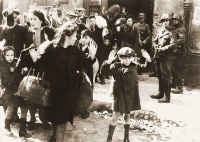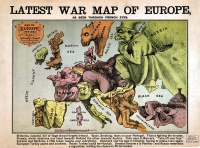War
From The Art and Popular Culture Encyclopedia
| Revision as of 10:05, 2 April 2013 Jahsonic (Talk | contribs) ← Previous diff |
Current revision Jahsonic (Talk | contribs) |
||
| Line 1: | Line 1: | ||
| - | [[Image:A Child at Gunpoint of the Stroop Report.jpg |thumb|right|200px|''[[A Child at Gunpoint]]'' ([[1810s]]) by [[Francisco de Goya]]]] | + | [[Image:A Child at Gunpoint of the Stroop Report.jpg |thumb|left|200px|''[[A Child at Gunpoint]]'' ([[1943]]) from the ''[[Stroop Report]]'']] |
| - | [[Image:Horrors of war by Goya.jpg|thumb|right|200px|''[[Disasters of War]]'' ([[1810s]]) by [[Francisco de Goya]] | + | {| class="toccolours" style="float: left; margin-left: 1em; margin-right: 2em; font-size: 85%; background:#c6dbf7; color:black; width:30em; max-width: 40%;" cellspacing="5" |
| - | <br> | + | | style="text-align: left;" | |
| - | <small>With the early 19th century ''[[Disasters of War]]'', Goya continued a tradition set in motion by French 17th artist [[Jacques Callot]] with his ''[[The Miseries and Disasters of War]]'', both of them criticizing the [[horrors of war]] in their art]] | + | "It is [[forbidden]] to [[kill]]; therefore all murderers are [[Punishment |punished]] unless they [[mass murder|kill in large numbers]] and to the sound of [[trumpet]]s" --Voltaire [[It is forbidden to kill; therefore all murderers are punished unless they kill in large numbers and to the sound of trumpets |[...]]] |
| - | </small> | + | <hr> |
| - | [[Image:Callot, miseries of war.jpg|thumb|right|200px|''[[The Miseries and Disasters of War]]'' ([[1633]]) by [[Jacques Callot]] | + | "[[War is the continuation of politics by other means]]" --[[Carl von Clausewitz]] in ''[[On War]]'' (1832) |
| - | <br> | + | <hr> |
| - | <small>With the 16th century ''[[The Miseries and Disasters of War]]'', French 17th artist [[Jacques Callot]] anticipated [[Goya]]'s ''[[Disasters of War]]'', both of them criticizing the [[horrors of war]] in their art]] | + | "The [[putrid]] flesh, like the flesh of fishes, gleamed greenish-white through the rents in the uniform. I turned away and then started back in horror: close to me a figure cowered beside a tree. It wore the shining straps and belt of the French, and high upon its back there was still the loaded pack, crowned with a round cooking utensil. Empty eye-sockets and the few wisps of hair on the black and weathered skull told me that this was no living man." --''[[Storm of Steel]]'' (1920) by Ernst Jünger |
| - | </small> | + | |} |
| - | [[Image:D-Day.jpg|thumb|right|200px|''[[D-Day]]'' ([[1944]]) | + | [[Image:His Best Customer (Winsor McCay).jpg|thumb|right|200px|''[[His Best Customer]]'' (1917), [[political cartoon]] by Winsor McCay]] |
| + | [[Image:Callot, miseries of war.jpg|thumb|right|200px|''[[The Miseries and Disasters of War]]'' (1633) by Jacques Callot]] | ||
| + | [[Image:D-Day.jpg|thumb|right|200px|''[[D-Day]]'' (1944) | ||
| <br> | <br> | ||
| <small> | <small> | ||
| Line 14: | Line 16: | ||
| # The date of any [[major]] [[event]] [[plan]]ned for the [[future]]. | # The date of any [[major]] [[event]] [[plan]]ned for the [[future]]. | ||
| </small>]] | </small>]] | ||
| - | [[Image:George Bellows, Dempsey and Firpo (1924).jpg|thumb|right|200px|''Dempsey and Firpo'' ([[1924]]) by [[George Bellows]]]] | + | [[Image:Francisco de Goya y Lucientes 023.jpg|thumb|200px|''[[The Third of May 1808]]'' ([[1814]]) by [[Francisco de Goya]]]] |
| + | [[Image:Latest War Map of Europe as Seen through French Eyes.jpg|thumb|right|200px|[[Latest War Map of Europe as Seen through French Eyes]]]] | ||
| {{Template}} | {{Template}} | ||
| - | :"It is [[forbidden]] to [[kill]]; therefore all murderers are [[punished]] unless they kill in large numbers and to the sound of trumpets." --[[Voltaire]] | + | '''War''' is an organised and often prolonged conflict that is carried out by [[State (polity)|states]] or [[non-state actors]]. It is generally characterised by extreme [[violence]], [[Society|social]] disruption, and economic destruction. |
| - | + | == Namesakes == | |
| - | :"[[Film]] is a genuine art. It is genuine in that it is strictly popular. Like all the arts its apppeal is based on a few primitive, and therefore universal, instincts and mechanisms in man. [[Sex]] and [[combat]] are the chief instincts. --after [[Terry Ramsaye]] (1926). | + | * [[War (American band)]], a 1970s funk band |
| - | + | *''[[The War Game]]'', a 1965 television film on nuclear war by Peter Watkins | |
| - | == See == | + | *''[[Krieg dem Kriege]]'' (1924) by Ernst Friedrich |
| - | * [[War (band)]], a 1970s funk band | + | *[[Style war]] |
| + | == See also== | ||
| + | *[[Anti-war]] | ||
| + | **[[List of books with anti-war themes]] | ||
| *The [[art of war]] | *The [[art of war]] | ||
| - | *''[[The War Game]]'' | + | *[[Cannon fodder]] |
| - | *[[Terrorism]] | + | *[[Flashpoint (politics)]] |
| *[[Military-industrial complex]] | *[[Military-industrial complex]] | ||
| *[[World War I]] | *[[World War I]] | ||
| *[[World War II]] | *[[World War II]] | ||
| - | *[[Combat (newspaper)]], newspaper of the [[French Resistance]] | + | *[[World War III]] |
| *[[War of the sexes]] | *[[War of the sexes]] | ||
| *[[War on Drugs]] | *[[War on Drugs]] | ||
| - | == References == | + | *[[Terrorism]] |
| + | *[[The origin of war]] | ||
| + | *[[War crime]] | ||
| + | *[[Wartime sexual violence]] | ||
| + | *[[War reparations ]] | ||
| + | == Namesakes == | ||
| *''[[Pure War]]'' by Virilio | *''[[Pure War]]'' by Virilio | ||
| *''[[The Miseries and Disasters of War]]'' by Callot | *''[[The Miseries and Disasters of War]]'' by Callot | ||
| *''[[Bunker Archeology: Texts and Photos]]'' by Virilio | *''[[Bunker Archeology: Texts and Photos]]'' by Virilio | ||
| - | *''[[Disasters of War]]'' by Goya | + | *''[[The Disasters of War]]'' by Goya |
| {{GFDL}} | {{GFDL}} | ||
Current revision
|
"It is forbidden to kill; therefore all murderers are punished unless they kill in large numbers and to the sound of trumpets" --Voltaire [...] "War is the continuation of politics by other means" --Carl von Clausewitz in On War (1832) "The putrid flesh, like the flesh of fishes, gleamed greenish-white through the rents in the uniform. I turned away and then started back in horror: close to me a figure cowered beside a tree. It wore the shining straps and belt of the French, and high upon its back there was still the loaded pack, crowned with a round cooking utensil. Empty eye-sockets and the few wisps of hair on the black and weathered skull told me that this was no living man." --Storm of Steel (1920) by Ernst Jünger |

|
Related e |
|
Featured: |
War is an organised and often prolonged conflict that is carried out by states or non-state actors. It is generally characterised by extreme violence, social disruption, and economic destruction.
Namesakes
- War (American band), a 1970s funk band
- The War Game, a 1965 television film on nuclear war by Peter Watkins
- Krieg dem Kriege (1924) by Ernst Friedrich
- Style war
See also
- Anti-war
- The art of war
- Cannon fodder
- Flashpoint (politics)
- Military-industrial complex
- World War I
- World War II
- World War III
- War of the sexes
- War on Drugs
- Terrorism
- The origin of war
- War crime
- Wartime sexual violence
- War reparations
Namesakes
- Pure War by Virilio
- The Miseries and Disasters of War by Callot
- Bunker Archeology: Texts and Photos by Virilio
- The Disasters of War by Goya

.jpg)




